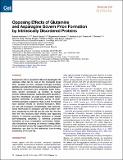Opposing Effects of Glutamine and Asparagine Govern Prion Formation by Intrinsically Disordered Proteins
Author(s)
Halfmann, Randal Arthur; Alberti, Simon; Krishnan, Rajaraman; Lyle, Nicholas; O'Donnell, Charles William; King, Oliver D.; Berger, Bonnie; Pappu, Rohit V.; Lindquist, Susan; ... Show more Show less
DownloadHalfmann-2011-Opposing Effects of.pdf (2.011Mb)
PUBLISHER_POLICY
Publisher Policy
Article is made available in accordance with the publisher's policy and may be subject to US copyright law. Please refer to the publisher's site for terms of use.
Terms of use
Metadata
Show full item recordAbstract
Sequences rich in glutamine (Q) and asparagine (N) residues often fail to fold at the monomer level. This, coupled to their unusual hydrogen-bonding abilities, provides the driving force to switch between disordered monomers and amyloids. Such transitions govern processes as diverse as human protein-folding diseases, bacterial biofilm assembly, and the inheritance of yeast prions (protein-based genetic elements). A systematic survey of prion-forming domains suggested that Q and N residues have distinct effects on amyloid formation. Here, we use cell biological, biochemical, and computational techniques to compare Q/N-rich protein variants, replacing Ns with Qs and Qs with Ns. We find that the two residues have strong and opposing effects: N richness promotes assembly of benign self-templating amyloids; Q richness promotes formation of toxic nonamyloid conformers. Molecular simulations focusing on intrinsic folding differences between Qs and Ns suggest that their different behaviors are due to the enhanced turn-forming propensity of Ns over Qs.
Date issued
2011-07Department
Massachusetts Institute of Technology. Computer Science and Artificial Intelligence Laboratory; Massachusetts Institute of Technology. Department of Biology; Massachusetts Institute of Technology. Department of Electrical Engineering and Computer Science; Massachusetts Institute of Technology. Department of Mathematics; Whitehead Institute for Biomedical ResearchJournal
Molecular Cell
Publisher
Elsevier
Citation
Halfmann, Randal, Simon Alberti, Rajaraman Krishnan, Nicholas Lyle, Charles W. O’Donnell, Oliver D. King, Bonnie Berger, Rohit V. Pappu, and Susan Lindquist. “Opposing Effects of Glutamine and Asparagine Govern Prion Formation by Intrinsically Disordered Proteins.” Molecular Cell 43, no. 1 (July 2011): 72–84. © 2011 Elsevier Inc.
Version: Final published version
ISSN
10972765
1097-4164